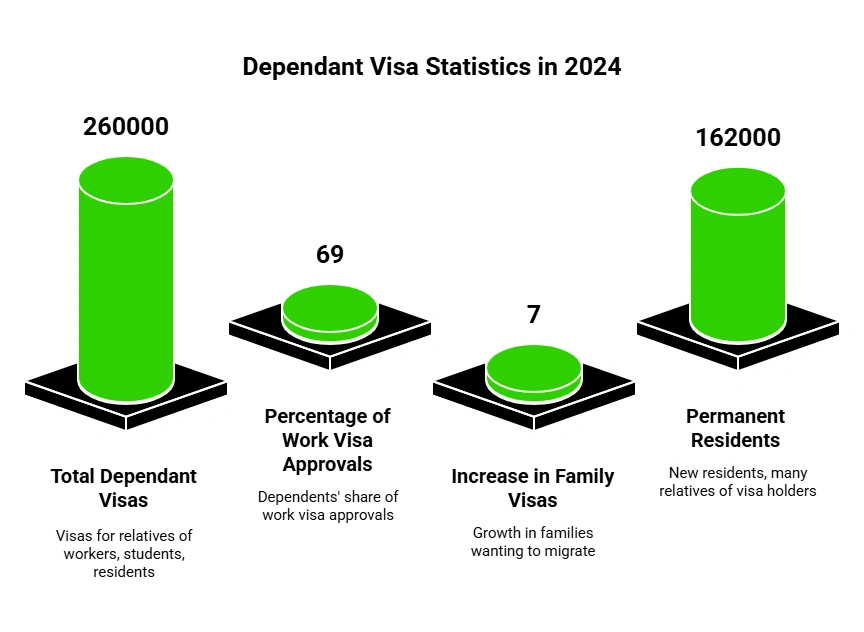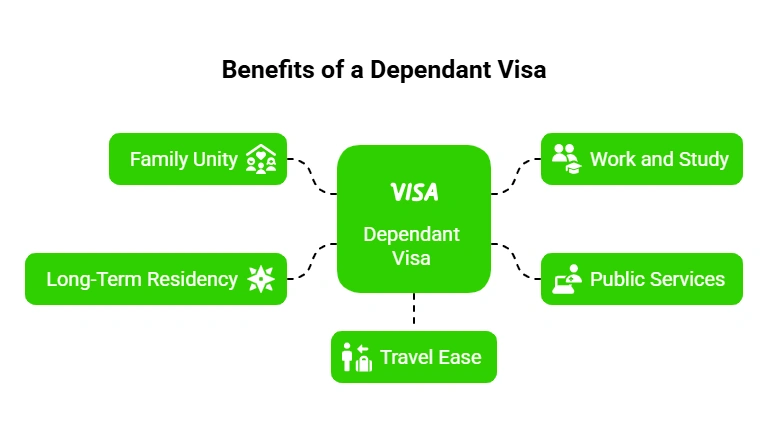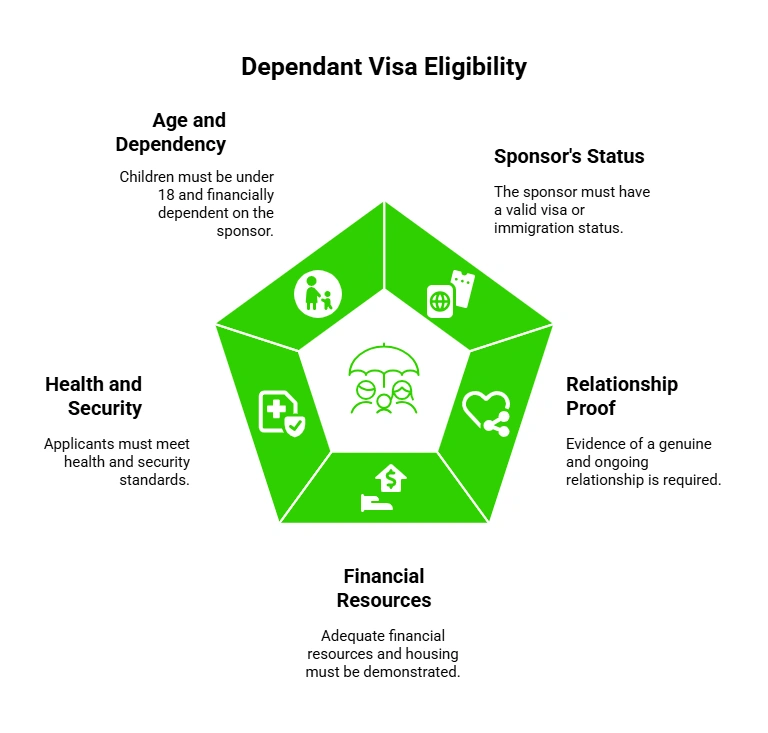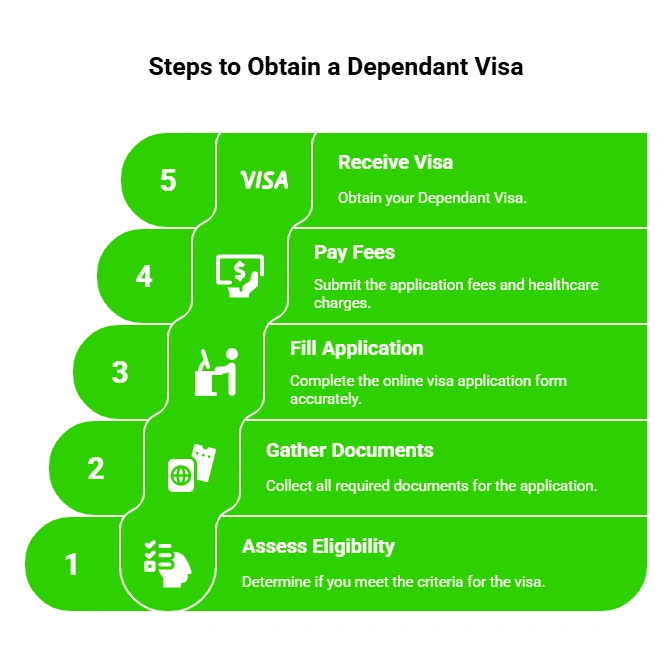Live abroad with your spouse, children and parents
Different countries have different criteria to assess applicant eligibility
Every country that offers an investment program has its own set of requirements and eligibility criteria.
Inquiry
You're already here. Welcome!
Expert Counselling
The counsellor will talk to you and understand your requirements.
Eligibility
Be eligible for this process and sign up for this process.
Documentation
All your documents will be compiled to create a strong application.
Processing
All your documents will be compiled to create a strong application.
Overseas Investor Program is a highly technical process. Our Evaluation Experts analyse your profile to help you make an informed decision. Your Eligibility Evaluation report contains.
Score Card
Country Profile
Occupation Profile
Documentation List
Cost & Time Estimation
The Dependant Visa allows families to live together in a foreign country. If you are moving abroad for work, school, or to live there permanently, your relatives can come with you and share the experience of building a life in that country.

A dependent visa allows family members, such as spouses, partners, children, or in some cases parents—to join a principal applicant (main visa holder) in a foreign country. It provides legal permission to stay with the primary visa holder for the duration of their visa.
*Looking for assistance to migrate overseas? Y-Axis is here to support you with the process.
Some of the benefits of a Dependant Visa are given below.

You can apply for a Dependant visa if you meet the criteria:
Dependant visas are connected to the primary applicant's visa category, including:
To be eligible, a Dependant must satisfy certain requirements:

When applying for a Dependant visa, you will generally need to submit the documents listed below.
The process to apply for a Dependant Visa is given below.
Step 1: Determine correct visa stream based on destination country
Step 2: Gather required documents (passport, relationship proof, sponsor’s status)
Step 3: Complete online or paper-based application
Step 4: Pay the required visa fee
Step 5: Schedule and attend biometrics and/or interview (if applicable)
Step 6: Wait for decision and visa issuance

The standard cost of Dependant Visa is given below.
| Fee Type | Estimated Cost (GBP) |
| Application Fee | £300 – £1,500 |
| Healthcare or Insurance Fee | £400 – £800 per year |
| Biometric Fee | £20 – £100 |
| Priority or Express Processing | £250 – £1,000 |
| Document Services | £50 – £200 (per document) |
The general processing times for Dependant visas are given below.
| Application Type | Estimated Processing Time |
| Standard Application (Outside Country) | 3 to 6 weeks |
| In-Country Switch or Extension | 6 to 8 weeks |
| Priority Processing | 5 to 10 working days |
| Super Priority / Express (if offered) | 1 to 2 working days |
| Complex or Special Cases | Up to 12 weeks or longer |
| Country | Dependent Visa Types |
| UK | - Spouse/Civil Partner Visa |
| - Child Dependent Visa | |
| - Parent (Exceptional Cases) | |
| USA | - H-4 (for H-1B dependents) |
| - L-2 (for L-1 dependents) | |
| - F-2 (for F-1 dependents) | |
| - J-2 (for J-1 dependents) | |
| Canada | - Spouse Open Work Permit |
| - Child Visa | |
| - Parents and Grandparents Sponsorship | |
| Australia | - Subclass 309/100 (Offshore Partner) |
| - Subclass 820/801 (Onshore Partner) | |
| - Subclass 101 (Child) | |
| - Subclass 103/143 (Parent) | |
| EU (e.g., Germany, France, Sweden) | - Family Reunification Visas for spouses, children |
| - Blue Card dependent permits | |
| - Long-stay family visas |
Individuals with Dependant visas have several rights:
Yes, those who are dependants can also seek settlement:
To ensure a smooth process, applicants should avoid these common mistakes:
Y-Axis has extensive experience assisting families with their immigration applications, aiming to reduce stress during the process by providing:
Apply Now
Explore what global Citizens have to say about y axis in shaping their future
Sweta - UK Dependent Visa
Y-Axis’ reputation has brought this clie
Read More...
Canada Work Dependent Visa
Y-Axis Client Swapna Review on Her Canad
Read More...
UK Dependent visa
Our client Mounika UK Dependent visa PC
Read More...
A Dependent Visa is a type of Visa that permits the spouses and kids to travel to an overseas nation for the purpose of accompanying/joining the family member with a corresponding Visa.
With a dependent visa, the dependents of a lawful migrant to a country such as spouse, dependent children or parents can enter and stay in the country. Such dependents can apply for a visa to join the migrant in the country.
To apply for the visa on behalf of the dependents, the applicant has to prove that he has enough funds to support the dependents and will not rely on state or public funds to support them. Dependents on their part will have to prove that they intend to live with the primary applicant during their stay and their relationship is genuine.
Children under 18 will have to prove that they are not leading an independent life and rely on the primary applicant for support.
Documents that prove the relationship are required such as marriage certificate in case of spouse and birth certificate in case of children.
There are several documents needed for Spouse Visa. The exact documents will depend on the nationality of the spouse and the nation of residence. Passport copy, Birth certificate, proof of relationship, police reports, etc. will be needed.
There are several documents needed for Spouse Visa. The exact documents will depend on the nationality of the spouse and the nation of residence. Passport copy, Birth certificate, proof of relationship, police reports, etc will be needed.
The fundamental documents required are:
Apart from this in some countries it is required that the primary applicant and the spouse must be above 18 years of age. A birth certificate will be required to prove this.
The primary applicant must have proof in the form of bank statements that he has the necessary funds to support his spouse and other dependents.
The processing times for Spouse Visa are variable based on the nation of immigration and individual circumstances. It can take around a few weeks to few months.
The processing of a spouse visa for Canada can take up to 12 months whereas the spouse visa for Australia can take between 11 to 15 months. In the UK the spouse visa takes about 2 to 12 weeks whereas in the US it takes an average of 6 to 9 months.
The English test required for Spouse Visa is IELTS.
You can apply for the Family Visa by collating the required documents:
After collating the required documents:
The U.S
There are many steps to the process of getting a family member from a foreign nation to the U.S. The U.S. sponsor, who may be a citizen or a green card holder, files Form I-130 with USCIS. Type I-130 provides details that confirms the family relationship ‘s validity. The U.S. supporter would need to supplement the form with documentation showing their citizenship or green card status, as well as documents proving their relationship with the foreign national.
Canada
The initial visa application for new immigrants to Canada will include family members, such as spouse and minor children, while parents, grandparents, and others must be supported by Canadian citizens and permanent residents.
In general, your spouse or common-law partner will be included in your own immigration application. The dependent children of your spouse can also be included in your visa application.
The U.K
Visa holders in the U.K can apply for a family visa for the following dependents:
Spouse or legal partner
Child under 18
Child over 18 if they’re currently in the UK as a dependent
The applicant must prove that he can support his dependents when they are in the UK. He must prove that he has the required funds by showing his bank statement.
Germany
Immigrant workers wishing to bring their family members to Germany must meet the following conditions:
Australia
Australia allows international students and professionals to call their families to Australia under the Dependent Visa program.
If you are coming to Australia to study, you are eligible to bring your family members with you. You can either include them on your original student visa application or you can apply for their visas once you have started your course in Australia so that they can join you. Spouses, partners and unmarried children under the age of 18 are eligible for dependent visas.
If you are coming to Australia on a work visa, your dependent family members are eligible to join you on dependent visas.
If you are coming to Australia on temporary worker visa, only your spouse or de facto partner and any unmarried children under the age of 18 are eligible for dependent family visas.
If you are coming to Australia on a migrant worker or business visa, any dependent family members are eligible to join you including:
The following are the basic requirements for a sponsor:
You must be able to financially support the dependent(s).
You must be a permanent resident.
Or
A valid work permit is required.
The likelihood of a dependent visa being denied is determined by a variety of factors. The following reasons are possible:
Filling out the application form incorrectly
The materials have been sent in an invalid format.
Failure to submit the necessary papers
Hiding of important visa-related information
Photocopies are being sent instead of actual documents (when asked)
Documents provided may have been forged.
Yes, but it depends on the type of visa. For example, spouses of H-1B visa holders on an H-4 visa may be eligible to work if the primary applicant has an approved I-140 (green card petition). If not, work is generally not permitted. However, studying is allowed, dependents can enrol in part-time or full-time courses without needing a separate student visa. It's a great opportunity for spouses or children to build their own academic path while staying in the U.S.
If you're moving to the U.S. on a work or student visa, your immediate family members may be eligible to join you on a dependent visa. Typically, this includes your spouse and any unmarried children under 21 years of age. To qualify, you must provide valid proof of your relationship, such as a marriage certificate or birth certificate. The U.S. immigration system doesn’t extend dependent visas to parents, siblings, or other relatives, so they would need to apply separately, such as under a visitor visa category.
To apply for a U.S. dependent visa, you will typically need the following:
Processing times can vary depending on your location and the time of year, but most dependent visa applications are completed within 2 to 4 weeks. This includes filling out the application, attending your biometrics appointment, and going for the visa interview at the U.S. Embassy or Consulate. Some locations may have longer wait times for appointments, so it’s a good idea to apply early. If there's an urgent need to travel, you can request an expedited appointment, though approval is not guaranteed.
Yes, you can apply for a dependant visa from within the country. If your current visa lets you switch while in the country, you can apply for a Dependant visa. This is usually possible for people with long-term visas like student, work, or temporary stay visas. Some short-term or visitor visas might not allow you to apply from within the country, so dependants would need to apply from abroad. It's important to check your host country's immigration rules to see if switching is allowed and if there are any specific requirements or deadlines before you apply for the Dependant visa.
Yes, most countries require the primary sponsor meets the minimum income or financial requirements. For most dependant visa pathways, the main visa holder needs to meet a minimum income level to provide for their family members. This might involve showing proof of steady income, savings, or a job offer that pays a specific amount. The necessary level changes based on the visa type, the number of dependants, and living costs in the country. The point is to make sure that dependants don't need public funds. It's a good idea to confirm the exact income needed early on and give clear financial documents when applying to avoid holdups or rejections.
Yes, you can switch from another valid visa to a Dependant visa. It is possible to change to a Dependant visa from some visa types, assuming you meet the requirements and your current visa allows changes while you're in the country. For example, those with work, student, or family visas may be able to change to a Dependant visa if they have the right kind of relationship with a main visa holder. Usually, you can't change from short-term or visitor visas. You'll have to apply again, go to a biometrics appointment, and meet all the requirements for finances, relationship status, and paperwork to change your visa.
Yes, those holding valid dependant visas can travel abroad and come back as long as their visa is still good. It's crucial to confirm that the visa or permit lets them re-enter. Travel shouldn't disrupt continuous residence if they plan to apply for permanent residency or citizenship later. Keep in mind that being away too often or for long periods could impact their eligibility for permanent residency or other benefits. When coming back, especially if they aren't with the primary visa holder, travellers need to have the right documents, like a valid passport, dependant visa, and proof they are related.
A Dependant visa's validity usually matches the main visa holder's allowed stay. For example, if the primary applicant has a two-year visa, the dependent's visa will likely last that long as well. Usually, a Dependant can renew their visa when the sponsor extends theirs. When both the sponsor and Dependant meet the residency requirement—often five years—they *can* apply for permanent residency. It is important to keep track of expiration dates and request extensions early to keep legal immigration status.
Yes, the time one resides on a dependant visa are taken into consideration for permanent residency assessment. Under many immigration laws, time spent in a country on a valid Dependant visa can count towards the total time needed to apply for permanent residency or settlement. Many countries require a continuous residence of five years, but this varies. Dependants should keep their legal status, limit their time spent outside the country, and follow all visa rules. When they meet the requirements, they can apply for permanent residency either on their own or with the main visa holder. It is vital to keep records of when you entered and left the country, confirm that you lived together, and satisfy any language or integration demands.
Several organizations can assist with dependent visa applications. The most reliable support comes from UK-regulated immigration advisers or solicitors, who are registered with the Office of the Immigration Services Commissioner (OISC). These professionals are authorized to provide immigration advice and handle applications on behalf of clients. In addition, global immigration consultancies, such as Y-Axis, specialize in visa assistance and offer end-to-end services, including eligibility assessments, document preparation, and submission guidance. Families should always verify that their chosen adviser is accredited to avoid fraudulent services and ensure that applications meet the Home Office’s official requirements.
Information about the rights and responsibilities of dependent visa holders is available on the UK Government website (gov.uk). This official source outlines conditions such as the right to work or study, restrictions on claiming public funds, and the importance of complying with visa conditions. Dependants are also expected to respect UK laws, maintain valid immigration status, and keep personal details up to date with the Home Office. Guidance is provided in the immigration rules and visa-specific policy documents. Families are strongly advised to check the official resources regularly, as policies and requirements are subject to change.
Dependent visa holders in the UK are generally entitled to access the National Health Service (NHS), provided the Immigration Health Surcharge (IHS) is paid at the time of application. This grants access to most healthcare services on the same basis as UK residents. However, some families choose to supplement NHS care with private health insurance for shorter waiting times, specialist consultations, or international coverage. Private policies are available through providers such as BUPA, AXA, or Vitality. The choice depends on individual needs, but the IHS payment ensures dependants have baseline healthcare security throughout their stay in the UK.